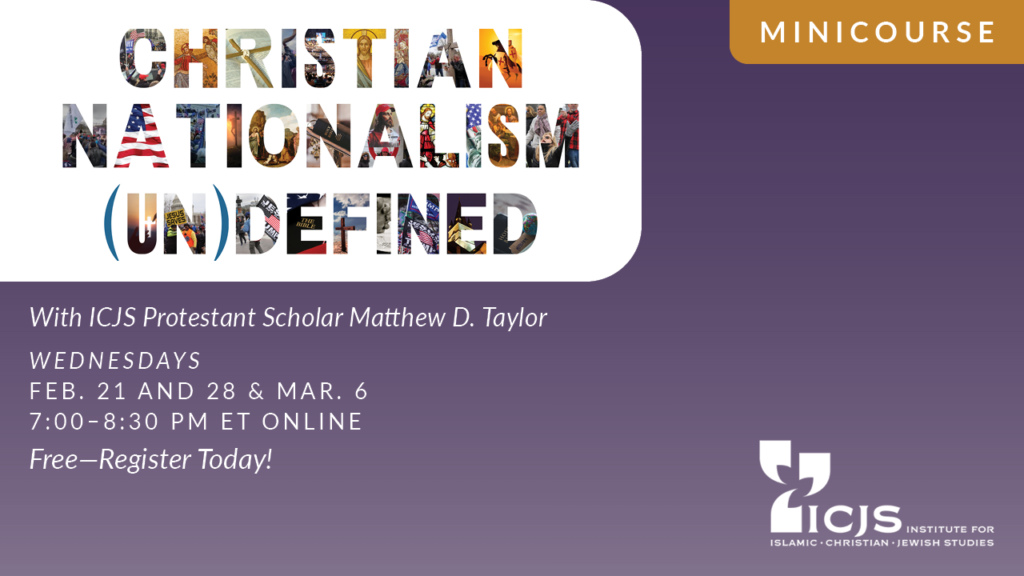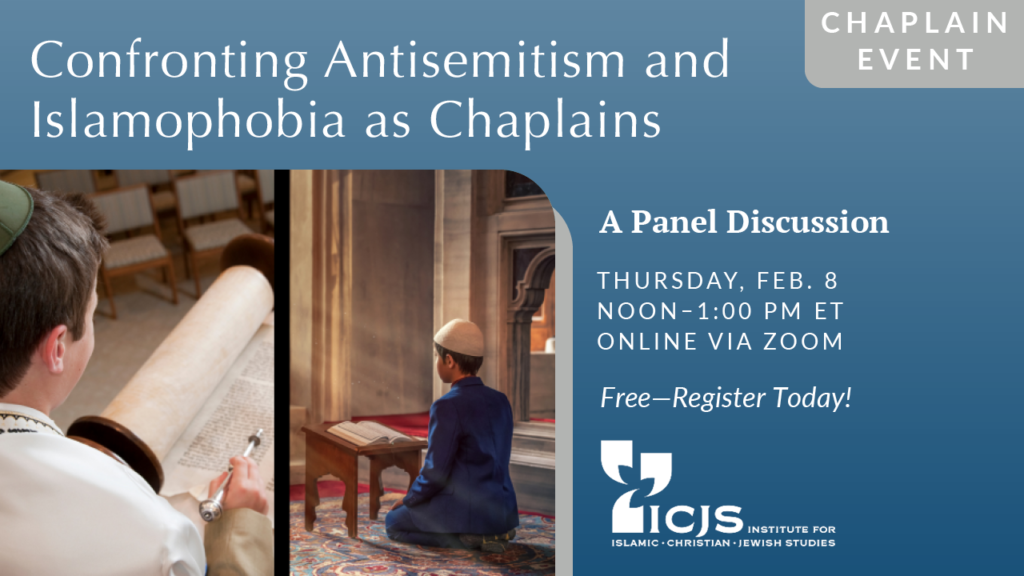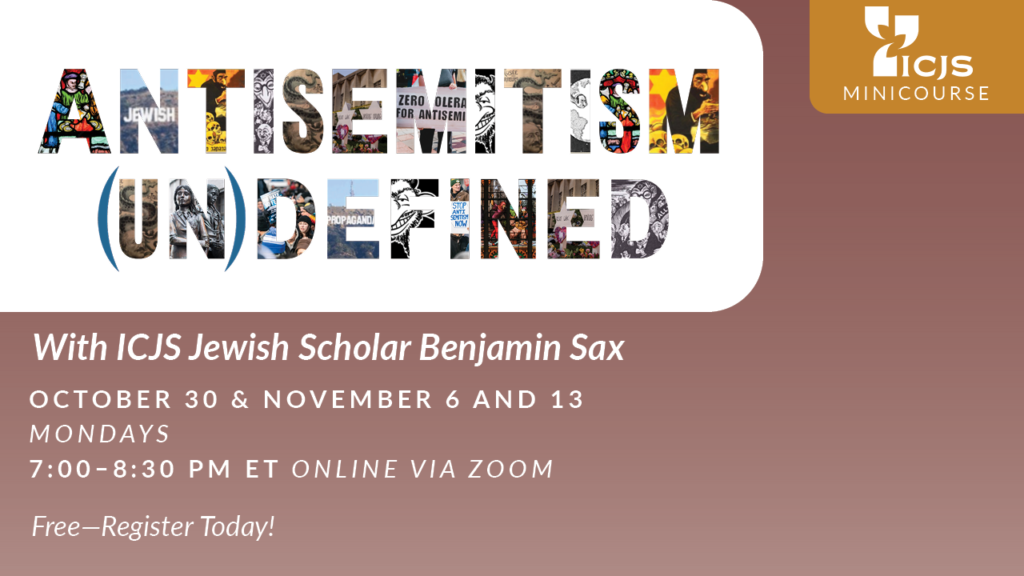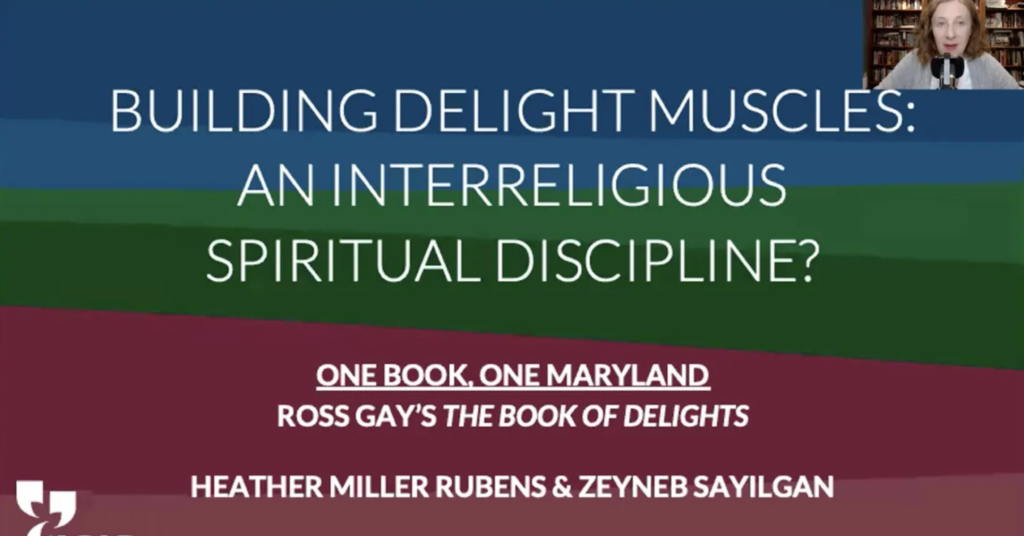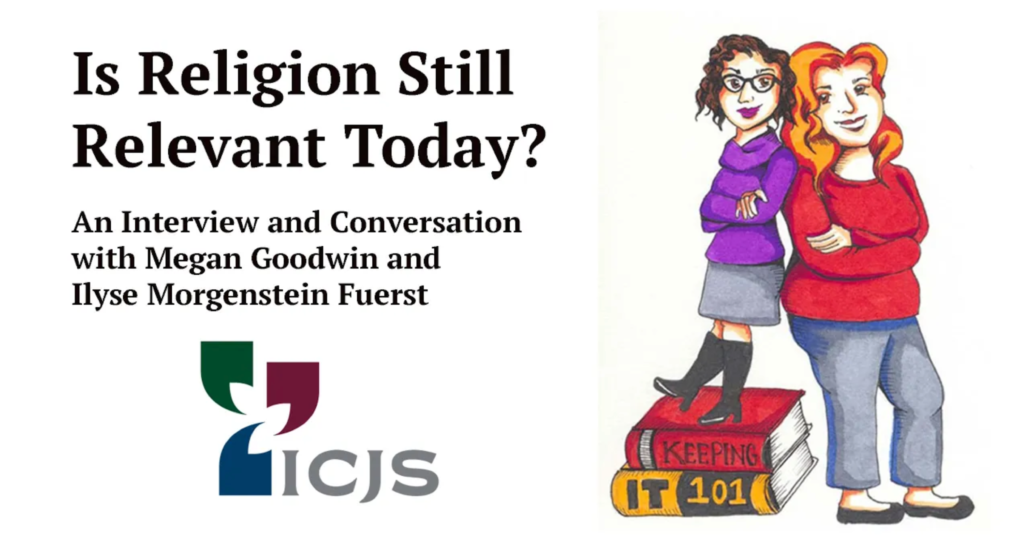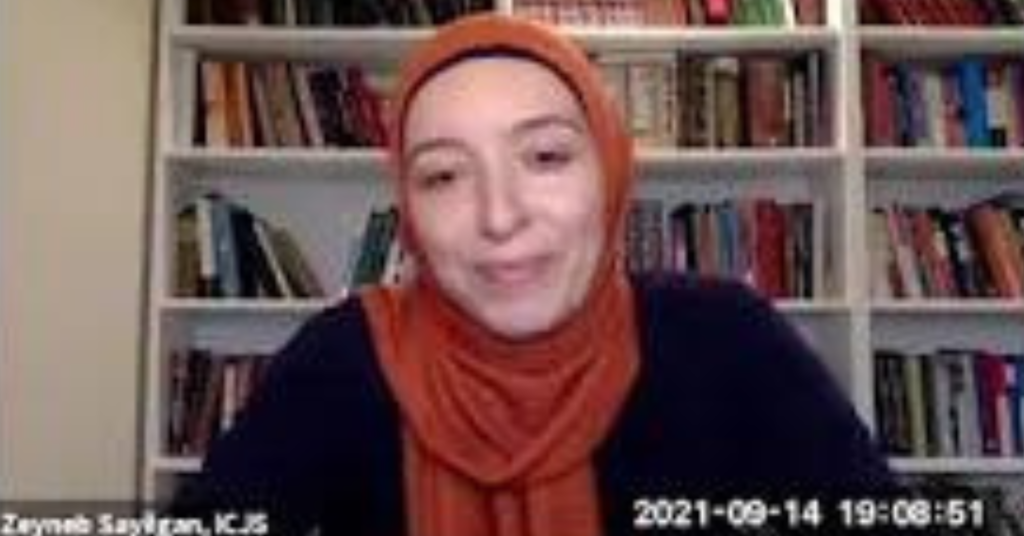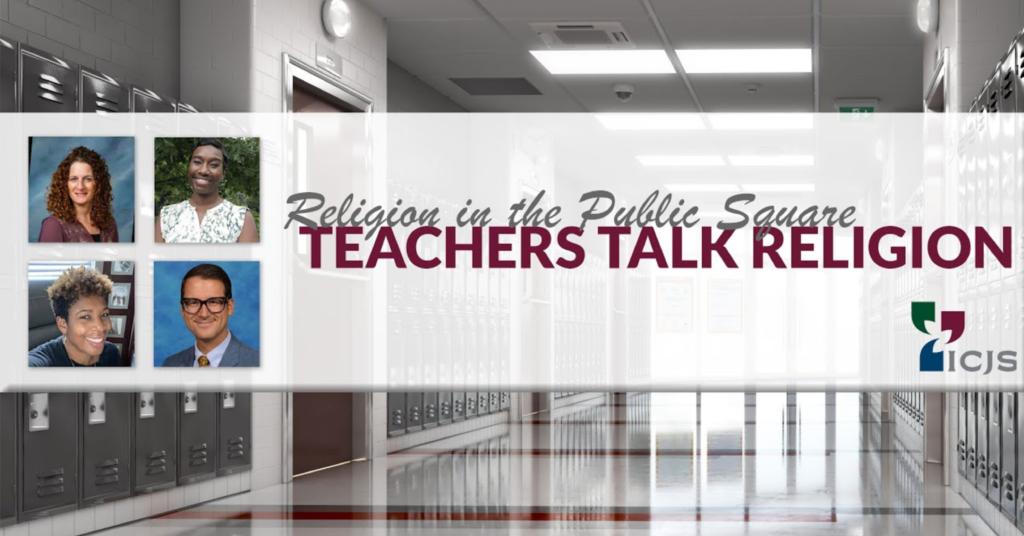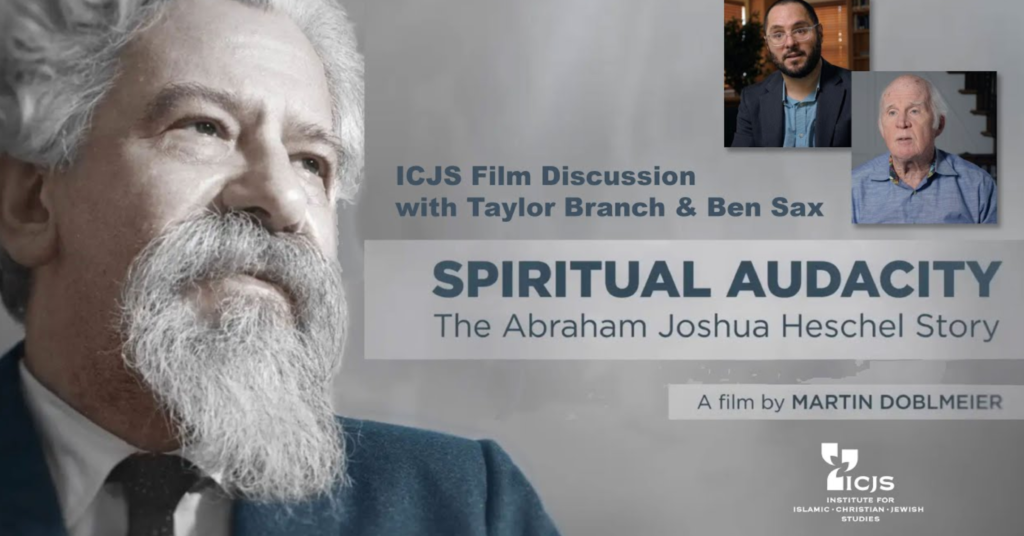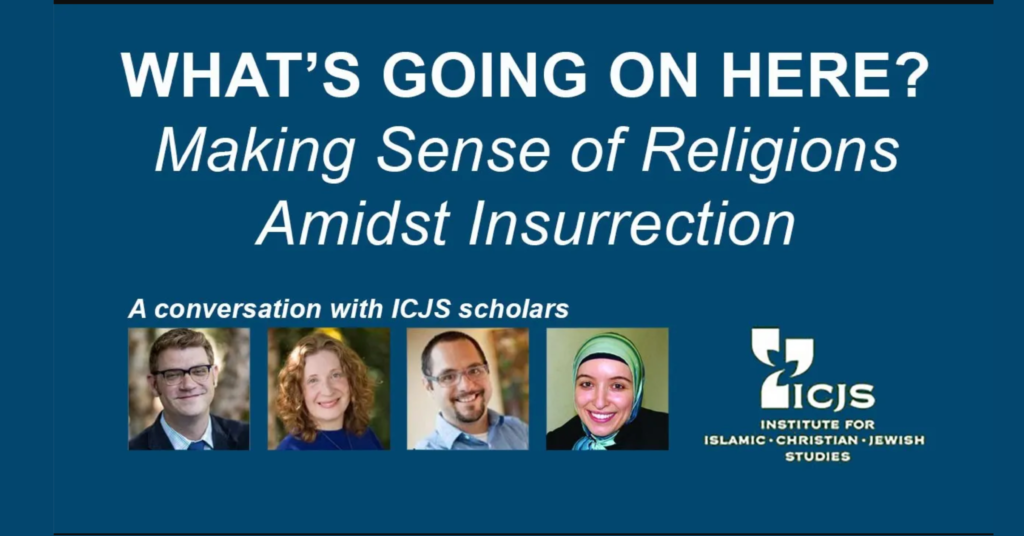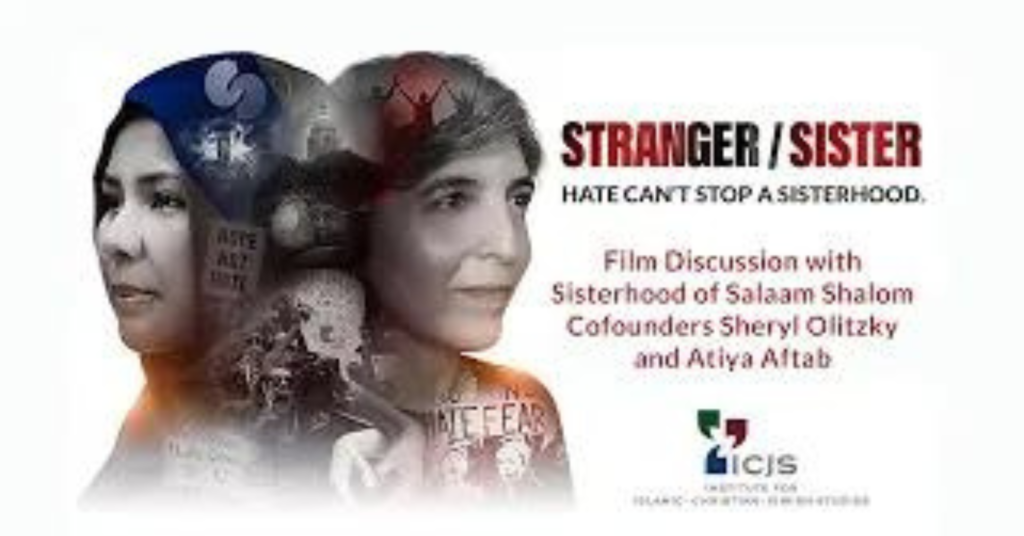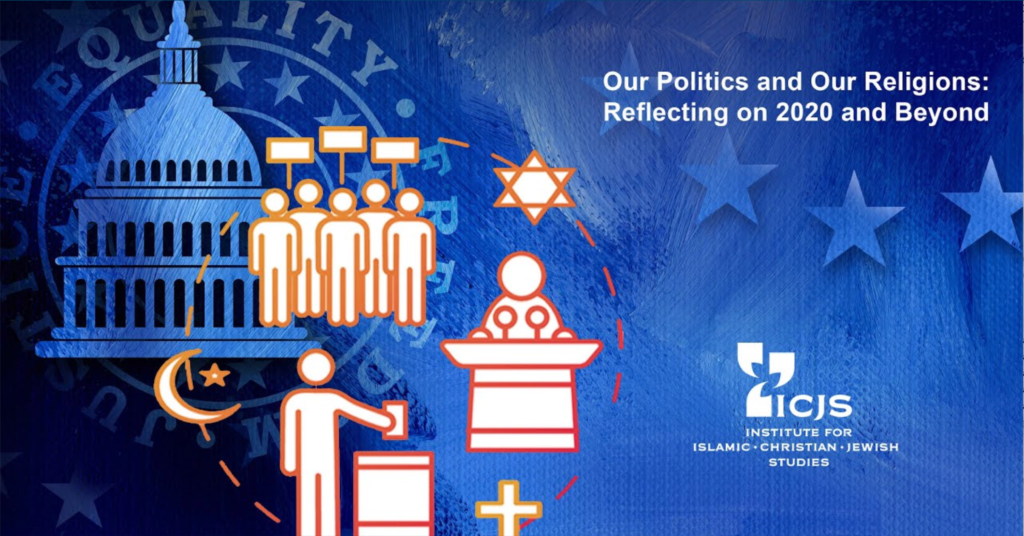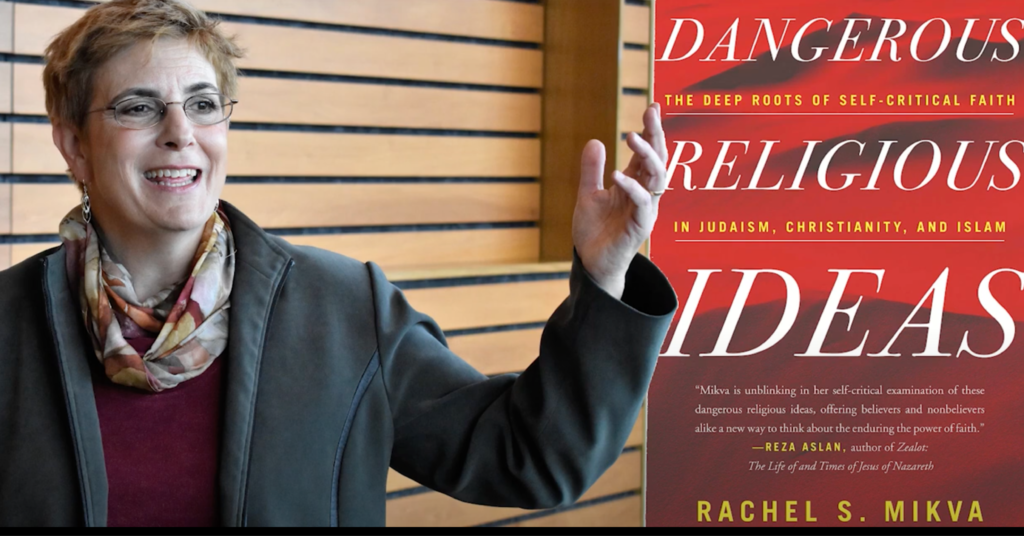On Demand Programs
ICJS presents regular public programs online featuring authors, scholars, teachers, activists, or congregational leaders. Today these recordings form a rich library of resources to increase your religious literacy and understanding.
Christian Nationalism (Un)defined
In the past few years, Christian nationalism has surged to become a powerful force and a major topic in American politics. But even as the conversation about Christian nationalism has proliferated, there are raging debates about how to define it and understand its impact on American politics. This minicourse will try to understand these debates while not taking our eyes away from the peril of Christian nationalism.
Confronting Antisemitism and Islamophobia as Chaplains
In the wake of the conflict in Israel and Gaza, six organizations have created a task force to address the growing antisemitism and anti-Muslim bias we are witnessing throughout the world. Members of the task force talk about the purpose of their partnership and how they are working to support chaplains and spiritual care providers as they seek resources to address antisemitism and Islamophobia in their work.
Did the U.S. and Brazil Have Parallel Christian Insurrections?
On Jan. 8, 2023 thousands of supporters of former Brazilian president Jair Bolsonaro stormed government buildings in the capital city of Brasilia, seeking to overthrow the new administration of Luis Inácio Lula da Silva and reinstall Bolsonaro. The insurrection had eerie echoes of the Jan. 6, 2021 Capitol riot.
Antisemitism (Un)defined
Today, antisemitism is still a social and political problem. However, many disagree as to what it actually is. This course explores the various efforts in history to define antisemitism and the political factors that inform them.
When Radial Islam Met American Evangelicalism: A surprisingly hopeful story of pluralism
In his book, Scripture People: Salafi Muslims in Evangelical Christians’ America, ICJS Protestant Scholar Matthew D. Taylor explores the experiences of the Salafi community in America after 9/11 through a comparison with American Evangelicals. In conversation with ICJS Muslim Scholar Zeyneb Sayilgan, Matt shares his insights on this growing and morphing American Salafi movement.
Spiritual Care for the Grieving
Spiritual care providers are often called upon to accompany individuals during their time of grief. The impetus for this grief can range from loss of a long-held dream to the loss of a dear loved one. Whatever the catalyst, the grieving person must learn to navigate the complex feelings that arise from their loss. During this Chaplain Lunch and Learn, the panelists identified different forms of loss, how to support grieving care recipients, and the role spirituality and religion can play in navigating individual and collective grief.

Howard Thurman: Moral Anchor to the Civil Rights Movement
This minicourse introduces participants to Howard Thurman in the contexts of African American religious and cultural activism. It explores his relationships with pivotal 20th century actors including Mahatma Gandhi, Reinhold Neibhur, Abraham Heschel, Olive Schreiner, Rufus Jones, Paul Robeson, Martin Luther King, Jr. and Mary McCloud Bethune, demonstrating Thurman as connector and convener, who engineered spiritual reform and an inward journey towards common ground and interfaith work in America.
Rediscovering Susan Taubes: Jewish writer, philosopher, and mystic
Susan Taubes was an important 20th century figure in literature and Jewish thought whose work is being given a fresh appraisal, including a recent New Yorker essay. Elliot Wolfson, a philosopher and author of The Philosophical Pathos of Susan Taubes, discussed Taubes’ literature, her views on Judaism and Christianity, her view of Paul and the theological questions of the universal and the particular, and how Kabbalah may have informed those views.

Buddhist, Christian, Muslim, and Jewish Perspectives on Spiritual Care
This event featured an interactive discussion with four chaplains from four traditions—Buddhist, Christian, Muslim, and Jewish—to explore how spiritual care is understood and practiced within their contexts. Conversation includef information on what spiritual care providers need to know when providing care to someone from these traditions and what are common misconceptions.

Race, Trauma, and Healing: Insights from Jewish antiracism practitioners
Tracie Guy-Decker, senior partner of Joyous Justice, and Dr. Harriette Wimms, founder and executive director of Jews of Color Mishpacha Project, discussed their social justice work within the Jewish community and the ways in which they have addressed intergenerational trauma due to racism.

Messianic Judaism and Christian Zionism
Judaism and Christianity have had a long and entwined history ever since the early Christian church emerged from first-century Judaism. Today some Christians also identify as being Jewish (a.k.a., Messianic Jews), and many Christians, known as Christian Zionists, support the modern state of Israel for theological reasons. This course examined the background and present-day complexities of these Christian identifications with (or attachments to) Judaism.

Sacred Pregnancy: Birth, Motherhood, and the Quest for Spiritual Community
ICJS’ Christine Krieger engaged author Ann Duncan in a discussion of her multifaceted look at motherhood in her book, “Sacred Pregnancy: Birth, Motherhood, and the Quest for Spiritual Community.” Her work is part feminist discourse on motherhood, part sociological study of changing U.S. religious demographics, and part exploration of spiritual movements rooted in women’s reproductive health.

Interreligious Environmentalism:
Confronting the climate crisis together
As people of diverse religious and spiritual traditions, what are our responsibilities, connections, and obligations to environmental stewardship? What wisdom can we draw on from these traditions as we work to heal and preserve the earth? This event featured a discussion by panelists who approach environmentalism from a variety of angles, including advocacy, activism, mental health, and theology.
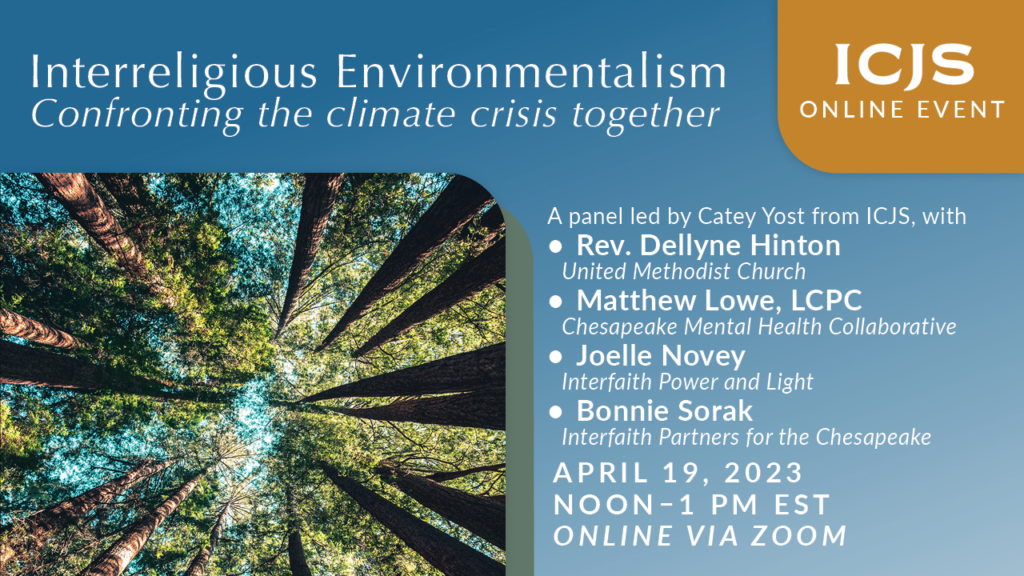
Holy Envy: Writing in the Jewish Christian Borderzone
Author Maeera Shreiber contends that although recent decades have seen great strides in Christian-Jewish relations, many interreligious encounters have become rote and predictable. Demonstrating how such emotions as shame, envy, and desire can inform these encounters, Shreiber’s book Holy Envy: Writing in the Jewish Christian Borderzone charts a new way of thinking about interreligious relations.
Ministry of Presence: A portrait of chaplains in Maryland
Chaplains provide spiritual care in a time when religious affiliation is declining. Amy Lawton of Brandeis University shares groundbreaking research conducted by the Chaplaincy Innovation Lab (Brandeis University) in partnership with ICJS. This research maps Maryland chaplains’ interreligious work and their challenges. Join us and learn how to support chaplains and spiritual caregivers—champions of religious pluralism in our society.
Recognizing and Responding to Everyday Antisemitism and Islamophobia
What do Antisemitism and Islamophobia look like in everyday life? Can we recognize them? How do we respond when we see them? ICJS scholars Benjamin Sax and Matthew Taylor—and visiting scholar Halla Attallah—examine instances of religious bias and bigotry in our everyday lives that are sometimes subtle and go unnoticed or unconfronted.
The Crusades: Are we prisoners of our interreligious History?
January 17, 24, 31 & Fabruary 7, 2023
The imagery and vocabulary of the Crusades inhabit our interreligious imaginations and structure our conceptions of violence. In this course, the instructors excavate the origins of these narratives and also call into question whether they are applicable to our interreligious encounters in the present. This course was taught be ICJS scholars Ben Sax and Matthew D. Taylor and visiting scholar Halla Attallah.
White Christian Nationalism and the Capitol Riot: How did we get here and what comes next?
January 6, 2023
In this online forum led by ICJS Protestant scholar Matthew D. Taylor, taking place on the second anniversary of the Capitol Riot, Onishi will talk about his new book “Preparing for War: The Extremist History of White Christian Nationalism—and What Comes Next,” in which he maps the origins of White Christian nationalism, with its steady blending of White grievance politics with evangelicalism, and traces its offshoots.
ALLAH: Same as Biblical God or Totally Other?
November 2–16, 2022
Muslims refer to the One God as Allah. In the popular imagination, the Muslim God is often perceived as alien and other than Christian and Jewish conceptions of God. Through study of the Muslim conception of God, we uncover a Qur’anic posture of interreligious dialogue that affirms sameness and difference alike.
God on the Ballot? A Discussion of Christian Nationalism on the Eve of the Election
November 7, 2022
A panel discussion on Christian nationalism, its impact on the midterm elections as well as how it stands to influence the presidential elections in 2024. The event was sponsored by ICJS and two Catholic University of America co-sponsors: the Department of Sociology and the Institute for Interreligious Study and Dialogue.
Advocating for democracy: a Jewish grassroots approach
Sept. 14, 2022
Faith-based organizations have a long history of involvement and achievement in grassroots community organizing. From the historic struggle for civil rights in the U.S. to present-day efforts to work toward racial equity, fair housing and clean elections, religious voices have been at the forefront. Laura Wallace, Maryland Organizing Director for Jews United for Justice, discussed how Jewish values inform their work promoting democracy and striving for social and economic equity.
On Being Muslim
June 8, 2022
Islam is a religion that nourishes body, heart, mind and soul. The word Islam literally means peace, surrender and submission. A Muslim is one who has made a conscious decision to freely surrender and submit to the one and only God, the creator of every thing and every being. In this online event, ICJS Muslim Scholar Zeyneb Sayilgan explained how Muslims try to embody these ideals in everyday life.
Muslim Prayer in America: Its Meaning and Practice
May 4-May 18, 2022
Salat, the ritual prayer performed by Muslims five times each day, is the centerpiece of Islamic spiritual practice. What is the significance of prayer in the daily life of Muslims? How does it encapsulate the whole of Islamic tradition? What is its content, structure, and meaning? ICJS Muslim Scholar Zeyneb Sayilgan, Ph.D., led an exploration of these questions through the study of Islamic texts: the Qur’an and Hadith.

Martin Buber: A Life of Faith and Dissent — A Conversation with Biographer Paul Mendes-Flohr
April 26, 2022
Following up on his recent course, ICJS Jewish Scholar Benjamin Sax led a conversation with Paul Mendes-Flohr, his friend and mentor, on his seminal biography, Martin Buber: A Life of Faith and Dissent.
Martin Buber and the Life of Dialogue
February 28-April 4, 2022
Martin Buber is one the most influential thinkers of the 20th century. This course explored his notion of dialogue as expressed in his corpus of writing, ranging from comparative mysticism to biblical commentary, existentialism to poetry, philosophy to cultural Zionism, and psychology to diplomacy.

An Interreligious Listening Session: In partnership with the Catholic Synod
March 31, 2022
As part of the process to prepare for the Roman Catholic Church’s 2023 Synod in Rome, the Archdiocese of Baltimore invited ICJS to offer insights on interreligious dialogue and our efforts to help build an interreligious society. The responses were compiled into a report to the Archdiocese of Baltimore, as well as the U.S. Conference for Catholic Bishops and the Vatican.
Recovered Voices 101: A Conversation with BSO Artistic Advisor James Conlon
March 10, 2022
Maestro James Conlon has devoted more than three decades to reviving and performing works of composers silenced by the Third Reich. In this event, Mr. Conlon explored these works and explained why he believes they deserve to be heard.
Economic Justice: Interreligious Reflections on Fairness and Dignity
February 3 – 24, 2022
This course drew upon Jewish, Christian, and Muslim traditions to explore how discrepancies in wealth and status affect our religious communities and impact broader society.

Walking the Justice Talk: How Four Baltimore Leaders Put Principles into Practice
February 22, 2022
In this panel, which is a companion to the ICJS course on Economic Justice, four Baltimore activists and nonprofit leaders discussed how their religious identities ground their motivation for doing their work to improve the Baltimore community and why thinking interreligiously matters. All four panel members were members of the 2021 ICJS Justice Leaders Fellowship.
Confronting Religious Hate in our Neighborhoods with Zeke Cohen
January 18, 2022
Baltimore City Council Member and former city schools teacher Zeke Cohen had a wide-ranging discussion with ICJS Executive Director Heather Miller Rubens, touching on his Jewish heritage as the grandson of Holocaust survivors, his experiences in the classroom and his response to antisemitic vandalism in his district. “It is deeply personal to me when I see swastikas appear in my district, or when I see acts of anti-Muslim bias or acts of racism,” he said.
The Roots and Realities of Christian Nationalism: Course
November 2, 9, and 16, 2021
Using the lens of history, sociology, and theology, Matt Taylor presents Christian nationalism today.
Building Delight Muscles: Ross Gay’s “The Book of Delights”
October 21, 2021
Book Discussion on Ross Gay’s The Book of Delights
In partnership with the Maryland Humanities Council’s One Book One Maryland
Is Religion Still Relevant Today?
September 24, 2021
Interview and Conversation with Megan Goodwin and Ilyse Morgenstein Fuerst
As academics, podcasters, authors, and commentators, Megan Goodwin and Ilyse Morgenstein Fuerst frequently focus their irreverent eye on how and where religion intersects with modern life. Join ICJS Scholar Matt Taylor in his conversation with Goodwin and Morgenstein Fuerst as they consider the importance of religion in public life and the breakdown of support for religious studies in both public education and universities.
9/11: Twenty Years Later, Discussion with ICJS Scholars
September 14, 2021
The world changed on 9/11. As we commemorate the 20th anniversary of the day that left the U.S. and the world reeling, it is worth reflecting upon how 9/11 and its aftermath impacted the religious and interreligious landscape of our society.
Panelists: Matt Taylor (moderator), Heather Miller Rubens, Zeyneb Sayilgan, and Ben Sax
Dabru Emet (Speak Truth): 20 Years Later Roundtable
June 17, 2021
Panel discussion with contributing scholars to the Dabru Emet Online Forum
Participants: Halla Attallah, Georgetown University; Mary C. Boys, Union Theological Seminary; Susannah Heschel, Dartmouth College; Laura Levitt, Temple University; Malka Z. Simkovich, Catholic Theological Union; Heather Miller Rubens, ICJS
Religion in the Public Square: Teachers Talk Religion
May 25, 2021
ICJS Teacher Fellows participate in a panel discussion.
Participants: Jill Aizenstein, Beth Tfiloh Dahan Community High School; Brendan Bailey, Loyola Blakefield ; Kenya Beard, Baltimore Polytechnic Institute; Patrice Frasier, Baltimore Polytechnic Institute.
Moderated by Christine Gallagher, ICJS Program Director, Teachers
Joshua Heschel Story (Film Discussion)
April 28, 2021
Taylor Branch, Pulitzer Prize-winning historian and ICJS Trustee Emeritus, and Benjamin Sax, ICJS Jewish Scholar, discuss the life and legacy of Rabbi Abraham Joshua Heschel in advance of a new documentary in which both are featured
What’s Going on Here? Making Sense of Religions Amidst Insurrection
March 29, 2021
From crosses to nooses, shamans to shofars, it can be hard to make sense of the wild mix of religious, civic, and conspiracy-theory images and symbolism that came together in Jericho Marches protesting the election results and culminating at the U.S. Capitol on January 6. ICJS Scholars discuss what they saw.
Stranger/Sister: Film Discussion with Sisterhood of Salaam Shalom
February 19, 2021
Sheryl Olitzky and Atiya Aftab, co-founders of the Sisterhood of Salaam Shalom, discuss their journey to build a movement connecting Jewish and Muslim women.
Our Politics Our Religions
January 22, 2021
In this post-Inauguration program, ICJS Fellows reflected on what religious and / or scriptural grounding brings them to take particular civic actions.
Panel participants: Pat Shannon Jones, Scott Adams, Josh Headley, Tracie Guy-Decker, Terrell Williams, Ben Sax, and Alisha Tatem
Dangerous Religious Ideas: Book Discussion with Rabbi Dr. Rachel S. Mikva
November 11, 2020
Dangerous Religious Ideas: The Deep Roots of Self-Critical Faith in Judaism, Christianity, and (Beacon, 2020) reveals how faith traditions have always passed down tools for self-examination and debate, because all religious ideas—not just extremist ones—can cause harm, even as they also embody important moral teachings.
Rabbi Dr. Mikva speaks with Ben Sax, ICJS Jewish Scholar
